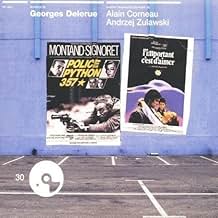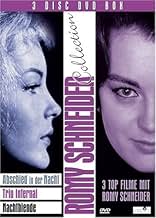Ajouter une intrigue dans votre langueServais Mont, a photographer, meets Nadine Chevalier who earns her money starring in cheap soft-core movies. Trying to help her, he borrows the money from the loan sharks to finance the thea... Tout lireServais Mont, a photographer, meets Nadine Chevalier who earns her money starring in cheap soft-core movies. Trying to help her, he borrows the money from the loan sharks to finance the theatrical production of 'Richard III' and gives Nadine a part. Nadine is torn apart between S... Tout lireServais Mont, a photographer, meets Nadine Chevalier who earns her money starring in cheap soft-core movies. Trying to help her, he borrows the money from the loan sharks to finance the theatrical production of 'Richard III' and gives Nadine a part. Nadine is torn apart between Servais, for whom she is falling in love, and her husband Jacques, to whom she has moral ob... Tout lire
- Prix
- 2 victoires et 3 nominations au total
- Le père de Jacques
- (scenes deleted)
- La mère de Jacques
- (scenes deleted)
- (as Andree Tainsy)
- Le médecin à l'hôpital
- (as Robert Dadies)
- …
Avis en vedette
Crammed in the high-ceiling, antique-looking Parisian apartments and loci like theatre, bar and hospital, its mise-en-scène strains to stay claustrophobic, fluid and quivering, signals the characters' shaky states, but, Zulawski and the screenwriter Christopher Frank fail to let their emotions run the full gamut to reach out its dazzled viewers, a stately but shallowly anaemic Testi cannot portray a role, whose inner depth is apparently out of his league, fumbles and routinely daydreams from scene to scene, his fervent gaze can not justify Servais' actions, his thoughts, and the limp dialogue doesn't help either.
Ms. Schneider, won Best Actress in the first-ever César Awards, is palpably more tapped into her role, sending off her raw charisma into her inwardly paralysed psyche, she tries to be frank with her own feelings, desire, dignity and pride at her own peril, but there are too many smoke and mirrors around to indulgently mystify an uncompounded, and fragmented story-line, the only thing to ameliorate the faint exasperation is when the pure dramatic sequences take the stage: Kinski's spit-fire flare-up is a mood-enforcer, Dutronc stands out in his chummy whims and delightfully erratic behavioural conundrum, a peculiar man who withdraws into a reprieve from, in an obvious tenor, a husband's functionality (abruptly falls into slumber so that his wife can only hopelessly play with herself to slake her desire), but also hatches up something seemingly unspeakable and inexplicable with Servais through an undertone of self-abandonment and total capitulation, in a muscle-versus-quirk contest over the same woman.
Zulawski's highbrow ambition to extract something refine and sophisticated out of the triangular deadlock doesn't consummately do the trick, in the end, Servais has to pay his debt with his blood and internal bleeding, from a father figure Mazelli (Dauphin), in his case, love IS the most important thing, if he can endure all the pain both physically and mentally, to demonstrate his unconditional devotion.
Georges Delerue's score is ever so conspicuous whenever a close-up is zoomed in between Servais and Nadine, to cloyingly illustrate their passion, otherwise, it remains forbidding and sinister, circles around a pessimistic account of love, in its purest but strangely tepid manifestation.
In fact, I would say most of the movie is spent on producing "art" that you are not proud of. This theme is throughout the movie. You get the impression that it is being bolted into your nerves like a physical trauma bolts in disdain.
We also deal with the end of youth and how we cope with it. The film is indeed extremely raw. The scenes are meant to be honest and to the point. We get very little sidestepping when it comes to the point of scenes. Perhaps the actors will discuss things in a roundabout way, but the theme slices through each scene like a scimitar.
On the subject of love. This is very important to the movie as well. Even though there are virtually no signs of it til the very end, there is a longing for it. And that is what most good romances are about. Sydney Pollock once said something to the effect of, the interesting part of a Romance Film is the longing for the connection between the characters. You can have a couple of slow motion scenes of them waltzing through the park and feeding each other fruits, but that isn't what drives the story and the film. Perhaps that is why this film is so good.
Must see.
Le saviez-vous
- AnecdotesRomy Schneider considered this movie her best work.
- Citations
Jacques Chevalier: J'ai rêvé de toi. Tu me versais du Coca-Cola dans l'oreille... Une vilaine mort, croyez-moi !
- Autres versionsItalian video version excludes some violent and explicit erotic scenes and runs 105 min.
- ConnexionsFeatured in La mano negra (1980)
Meilleurs choix
- How long is That Most Important Thing: Love?Propulsé par Alexa
Détails
- Date de sortie
- Pays d’origine
- Langue
- Aussi connu sous le nom de
- That Most Important Thing: Love
- Lieux de tournage
- sociétés de production
- Consultez plus de crédits d'entreprise sur IMDbPro
Box-office
- Brut – États-Unis et Canada
- 19 120 $ US
- Fin de semaine d'ouverture – États-Unis et Canada
- 5 370 $ US
- 16 juill. 2017
- Brut – à l'échelle mondiale
- 19 120 $ US
- Durée1 heure 49 minutes
- Mixage
- Rapport de forme
- 1.66 : 1
Contribuer à cette page



































